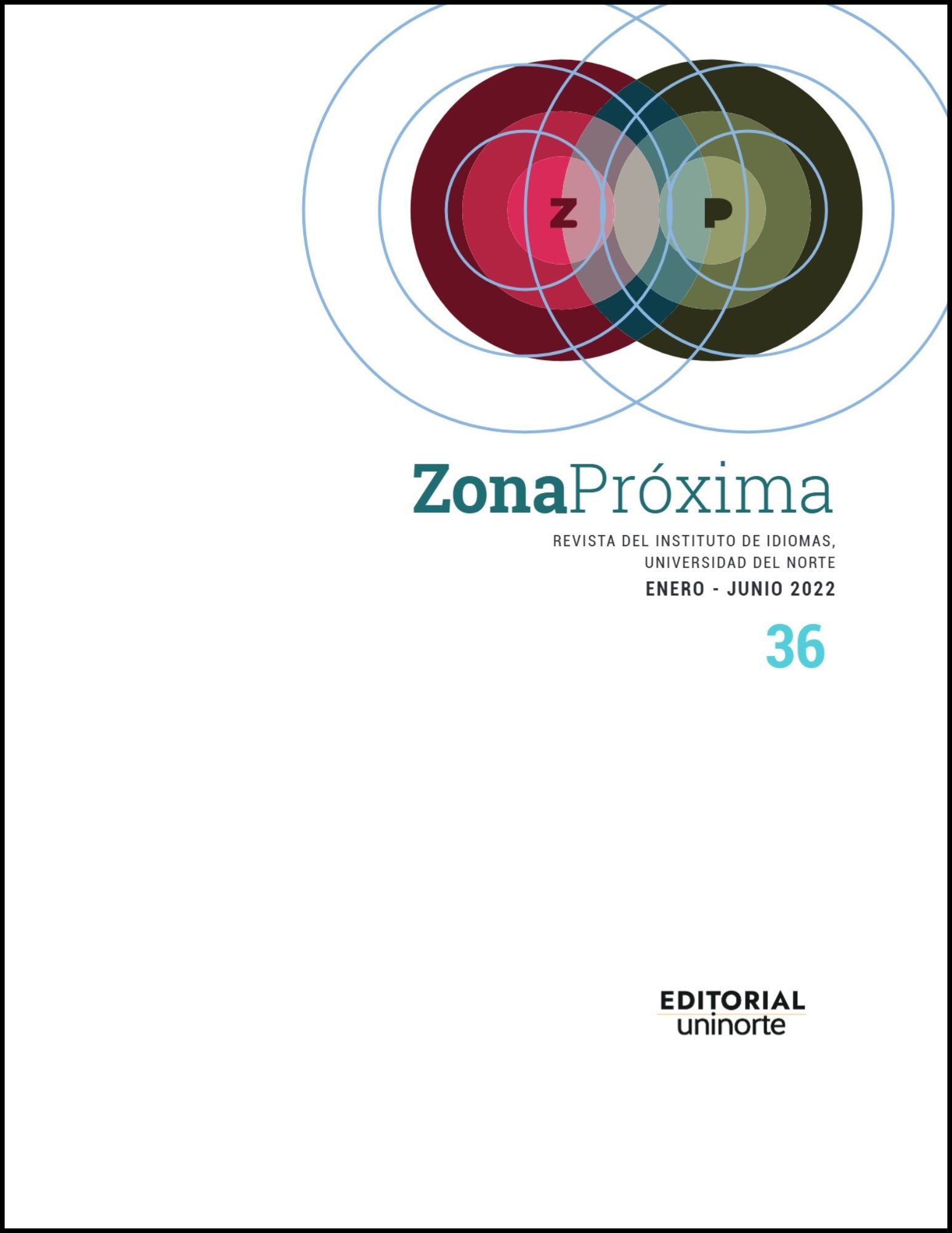Abstract
This article presents the research results on free games, an educational intervention used as a stra-tegy to improve language learning; in which students’ perception of evaluation was researched, evaluation strategies were designed and implemented, and the impact of free-game evaluation in basic secondary was analyzed at a public high school institution in the municipality of Pacho, Cundinamarca, Colombia. From the qualitative paradigm, and with participatory action research methodology, in which the experience of evaluation was initially explored in the institution, an evaluative model was proposed based on free games, where students participated in their design, to !nally evaluate this process. The proposal that raised the importance of the use of free games sought that, from the !rst moment the class was started, the game would be on and the evalua-tion criteria would be de!ned, which would be done through thematic development, reinforcement workshops, and the preparation and implementation of the evaluation. Data was collected from the academic results of the years 2017 and 2018, semi-structured interviews, checklists, and participating observation. Results show that free games became an effective strategy to improve learning, a fact that proved momentous for the appropriation of knowledge in a fun, active, and relevant way
References
Álvarez, B., González, C. y García, N. (2008). La motivación y los métodos de evaluación como variables fundamentales para estimular el aprendizaje autónomo. Revista de Docencia Universitaria REDU. DOI: 10.4995/redu.2007.6275
Arregui,O.(2019).Trabajandomúltiplesinteligenciasenlaeducacióncorporalatravésdeljuegocircense.https:// addi.ehu.eus/bitstream/handle/10810/43072/TFG_Arregui.pdf?sequence=1&isAllowed=y
Arufe, V. (2019). Fortnite EF, Un nuevo juego deportivo para el aula de Educación Física. Propuesta de innovación y gamificación basada en el videojuego Fortnite. Sportis 5(2), 323-350, DOI: https://doi.org/10.17979/sportis.2019.5.2.5257
Cajiao, F. (2018, enero a marzo). La Evaluación en el aula. Al Tablero. https://www.mineducacion.gov. co/1621/article-162344.html
Castrillón, L. (2017). Los juegos y su rol en el aprendizaje de una lengua. La Tercera Orilla (19), 87-93. https://revistas.unab.edu.co/index.php/laterceraorilla/article/view/2893/2389
Colmenares, E. (2012). Investigación-acción participativa: una metodología integradora del conocimiento y la acción. Voces y Silencios: Revista Latinoamericana de Educación, 3(1), 102-115. http://www.redalyc.org/pdf/184/18400804.pdf
Congreso de la República. (8 de febrero de 1994, Ley 115). Ley por la cual se expide la Ley General de la Educación. Bogotá, Colombia: Diario Oficial N°. 41.214. Recuperado de http://www.secretaria- senado.gov.co/senado/basedoc/ley_0115_1994.html
De Miguel, M., Catalá, Daniel., Santamaría, V. y Carabal, M. (2019). Aprendiendo liderazgo y trabajo en equipo mediante el juego fuera del aula. [ponencia]. V Congreso de Innovación Educativa y Docencia en Red. Valencia, España. .https://riunet.upv.es/bitstream/handle/10251/129064/de-Miguel- Molina%3bCatal%c3%a1-P%c3%a9rez%3bSantamarina-Campos%20-%20Aprendiendo%20 liderazgo%20y%20trabajo%20en%20equipo%20medi....pdf?sequence=1&isAllowed=y
Del Moral, E., Fernández, C. y Guzmán, P. (2016). Proyecto Game to learn: aprendizaje basado en juegos para potenciar las inteligencias lógico-matemática, naturalista y lingüística en educación primaria. Revista de Medios y Educación, (49), 173-193. http://www.redalyc.org/articulo. oa?id=36846509013
Gallardo, J. (2018). Teorías del juego como recurso educativo. Innovagogía, (1), 1-12. https://rio. upo.es/xmlui/bitstream/handle/10433/6824/Gallardo-LpezJos-AlbertoGallardo-VzquezPedro. pdf?sequence=1&isAllowed=y
Gallardo, J. y Gallardo, P. (2018). Teorías sobre el juego y su importancia como recurso educativo para el desarrollo integral infantil. Revista Educativa Hekademos, 24(11), 41-51.https://rio.upo.es/ xmlui/bitstream/handle/10433/6786/hekademos%2018.pdf?sequence=1&isAllowed=y
García, A. (2016). El juego y otros principios pedagógicos. Supervivencia en la educación a distancia y virtual RIED. Revista Iberoamericana de Educación a Distancia, 19(2), 25- 46. http://www.re- dalyc.org/articulo.oa?id=331445859001
Garaigordobil, M. (2016a). El juego en la primera infancia. Ediciones Octaedro.
Gómez, M., Echeverri, J. y González, L. (2016). Estrategia de evaluación basada en juegos: Caso Ingeniería de Sistemas Universidad de Medellín. Revista chilena de ingeniería, 25, (4), 633-642. https://scielo.conicyt.cl/pdf/ingeniare/v25n4/0718-3305-ingeniare-25-04-00633.pdf
González, P. y Bermello, L. (2017). Los juegos lingüísticos y su tratamiento en la clase de Lenguas Extranjeras. VARONA, núm. esp., 1-12. http://www.redalyc.org/articulo.oa?id=360657468012
Hernández, R. Fernández, C. y Baptista, P. (2014). Metodología de la Investigación. (6.a ed.). McGraw- Hill.
Huizinga, J. (1972). Homo Ludens. Alianza Ed.
Martínez C. (2012). El muestreo en investigación cualitativa.
Principios básicos y algunas controversias. ARTIGO ARTICLE. Ciência & Saúde Coletiva, 17(3), 613- 619. https://www.scielo.br/pdf/csc/v17n3/v17n3a06.pdf
Maquilón, J. Sánchez, M, y Cuesta, J. (2016). Enseñar y aprender en las aulas de Educación Primaria. Revista Electrónica de Investigación Educativa, 18(2), 144-155. http://redie.uabc.mx/redie/arti- cle/view/955
Mayol, G. (2016). El juego didáctico como recurso para el aprendizaje cooperativo de biología en 2° ba- chillerato [tesis de maestría, Universidad Internacional de la Rioja]. https://www.co-search. com/co/search?q=el%20juego%20didactico%20como%20recuerso%20para%20el%20apren- dizaje%20cooperativo%20de%20biologia%20en%202%C2%B0%20bachillerato&source=7c- b87d9645cd47f5907488ecb9b8a57f
Ministerio de Educación Nacional. (MEN). (2017). Evaluación. https://www.mineducacion.gov. co/1759/w3-article-179264.html
Ministerio de Educación Nacional. (MEN). (2008). Usar la Evaluación en el aula para mejorar. Periódico Al Tablero N° 44. https://www.mineducacion.gov.co/1621/article-162385.html
Ministerio de Educación Nacional. (MEN). (1998). Serie de Lineamientos curriculares en Lenguaje. https://www.mineducacion.gov.co/1621/articles-339975_recurso_6.pdf
Ramírez, S. (2019). Estrategias didácticas para fortalecer el pensamiento ciudadano en los estudiantes de noveno grado de la Institución Educativa Anna Vitiello. Zona Próxima, 30, 20-31. http:// www.scielo.org.co/scielo.php?pid=S2145-94442019000100020&script=sci_abstract&tlng=es
Romero, C. (2007). La escuela Media en la sociedad del conocimiento: Ideas y herramientas para la gestión Educativa, autoevaluación y planes de mejora. (1.a reimpr.). Centro de Publicaciones Educativas y Material Didáctico
Rosas y Ceric. (2015). ¿Pruebas Tradicionales o Evaluación Invisible a Través del Juego? Nuevas Fron- teras de la Evaluación Cognitiva. PSYKHE 2015, 24(1), 1-11. https://scielo.conicyt.cl/pdf/ psykhe/v24n1/art08.pdf
Sánchez- Amaya, T. (2013). La evaluación educativa como dispositivo de constitución de sujetos. Revista Latinoamericana de Ciencias Sociales, Niñez y Juventud, 11(2), 755- 767. https://www. redalyc.org/pdf/773/77329818021.pdf
Sánchez, M., Morales, M. y Rodríguez, M. (2017). Fortalecimiento de la creatividad en la educación preescolar orientada por estrategias pedagógicas basadas en el arte y la literatura infantil. Zona próxima: revista del Instituto de Estudios Superiores en Educación, 27, 61-81. https://www.redalyc. org/pdf/853/85352029005.pdf
Torres, D. (2017). Representaciones sociales de docentes sobre la evaluación formativa mediada por Redes sociales. Íkala, Revista de Lenguaje y Cultura Medellín, Colombia, 22(2), 255-268. http:// www.scielo.org.co/scielo.php?script=sci_abstract&pid=S0123-34322017000200255
Muñoz, C. y Valenzuela, J. (2014). Escala de Motivación por el juego (EMJ): Estudio del uso del juego en contextos Educativos. RELIEVE, 20(1), 1-15. DOI: 10.7203/relieve.20.1.3878
Organización para la Cooperación y el Desarrollo Económicos. (OECD). (2018) PROGRAMME FOR INTERNATIONAL STUDENT ASSESMENSST (PISA) RESULTS FROM PISA 2018. http://www. oecd.org/pisa/publications/PISA2018_CN_COL_ESP.pdf
Osés, R.M, Duarte, E y Pinto, M. L. (2016). Juegos cooperativos: efectos en el comportamiento asertivo en niños de 6o. grado de escuelas públicas. Revista Electrónica de Investigación Educativa, 18(3), 176-186. http://redie.uabc.mx/redie/article/view/886


